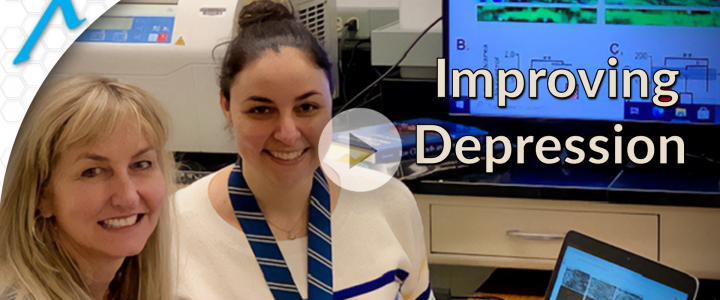Did you know that depression is more common in those with autism and/or Fragile X? Even more disturbing is the discovery that current treatments for depression do not work in Fragile X mice. With this grant, the team will work to develop a rapid screening tool to identify FDA-approved drugs which can treat depression in people with Fragile X syndrome.
Read moreResearcher
mRNA Therapy for Fragile X Syndrome

Dr. Kathryn Whitehead, Associate Professor at Carnegie Mellon University, helped develop the revolutionary science behind the COVID-19 vaccines. With a $103,000 grant from FRAXA, her team will now adapt this technology to deliver the missing Fragile X protein, to treat people who have Fragile X syndrome.
Read moreRecruiting: BRIDGE Study (BRain Indicators of Developmental Growth)
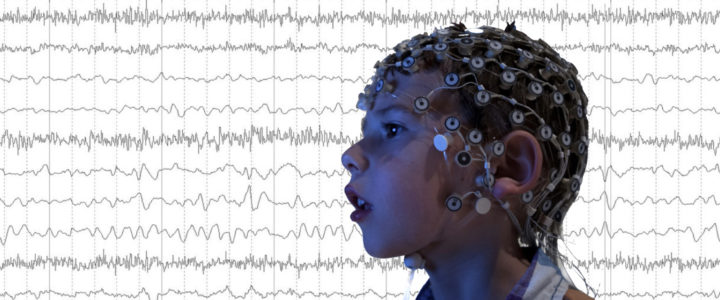
This study from the Wilkinson Lab at Boston Children’s Hospital is investigating how differences in brain activity affect learning, language and behavior in children with Fragile X syndrome, Down syndrome, and Autism Spectrum Disorder. One of the goals is to find brain markers that predict cognitive, language, and behavioral difficulties in these groups. Another goal is to better understand the differences in brain activity between young children with and without Fragile X and Down Syndrome, and whether these differences are similar in children with Autism Spectrum Disorder.
Read moreRecruiting: Clinical Study of Non-Invasive EEG for Children Ages 2-7
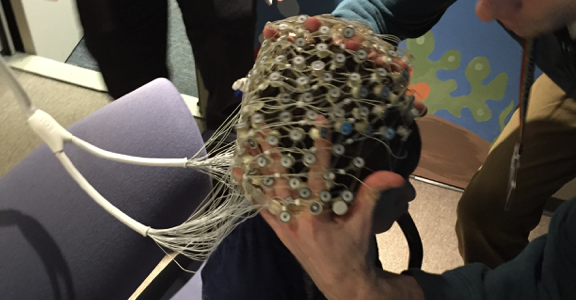
Dr. Carol Wilkinson, MD PhD, and Dr. Charles Nelson, PhD, at Boston Children’s Hospital are recruiting children ages 2-7 years with Fragile X syndrome to participate in a study of brain differences using non-invasive EEG.
Read moreCorrecting Fragile X Syndrome Deficits by Targeting Neonatal PKCε Signaling in the Brain

With this $90,000 grant from 2017-2018, Dr. Banerjee’s team has shown that enhancing PKCε can correct brain development and abnormal behaviors in Fragile X knockout mice and had their findings published in PubMed.
Read morePotential Upcoming Advances in Fragile X Research

Dr. Peter Kind, Director of the Patrick Wild Centre and Professor of Developmental Neuroscience at the University of Edinburgh, and Dr. Nahum Sonenberg, James McGill professor of biochemistry at McGill University, share their optimism about the next 10 years of Fragile X research. They discuss where they think the next big discoveries will emerge.
Read moreLovamix: Clinical Trial of Combined Treatment of Minocycline and Lovastatin in Fragile X Syndrome
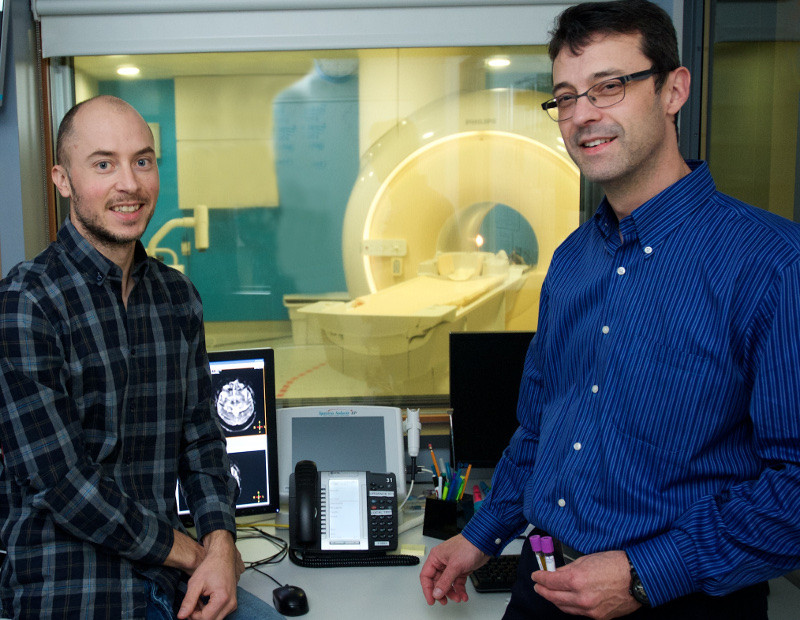
With a $66,714 grant from the FRAXA Research Foundation awarded over 2015-2017, Dr. Francois Corbin at the Universite of Sherbrooke will test the safety and synergistic effects of lovastatin and minocycline in patients with Fragile X syndrome.
Read moreReactivating the Fragile X Gene in Young Mice Reverses Symptoms

A new FRAXA-funded research project offers hope that Fragile X syndrome could be treated by reactivating the gene which is shut down in people with the syndrome. Researchers at the University of California, Riverside report that they were able to reduce FXS symptoms by inserting the FMR1 gene into the brains of very young mice.
Read moreGABA-A Receptor in Fragile X Syndrome

With $210,000 in grants from FRAXA over 1999-2010, Dr. Frank Kooy has studied the involvement of the GABAergic system in Fragile X syndrome, at the University of Antwerp, Belgium.
Read moreCharacterization of a Novel CYFIP1 – Derived Peptidomimetic Restoring the Dysregulated mRNAs Translation: Toward An Innovative Therapeutic Strategy for FXS

The researchers are developing next-generation drugs called peptidomimetics, using the functional features of FMRP. If they succeed, the hope is that we will have new drugs that could make up for the loss of FMRP, thus treating Fragile X syndrome.
Read moreFX-Learn Clinical Trial for Children with Fragile X

Thirteen centers across the US enrolled children with Fragile X in a large-scale clinical trial of Novartis AFQ056. Dr. Elizabeth Berry-Kravis and colleagues aim to show that this targeted treatment — an mGluR5 blocker for Fragile X which failed in previous adult human trials — can be better evaluated by studying effects on learning in young children.
Read moreCannabinoids as a Treatment for Fragile X Syndrome

Many people with Fragile X syndrome are hyper-sensitive to sights and sounds, and Electroencephalography (EEG) studies show that there are abnormalities in brain circuits. EEG studies show similar changes in Fragile X mice. So the team will use EEG tests in mice to find which drugs best reduce hypersensitivity. They can then easily move on to human EEG-based clinical trials. What they learn will tell us much more about why people with Fragile X are hypersensitive – and which drugs could best help them.
Read moreCorrecting the Brain’s Emotional Memory Center
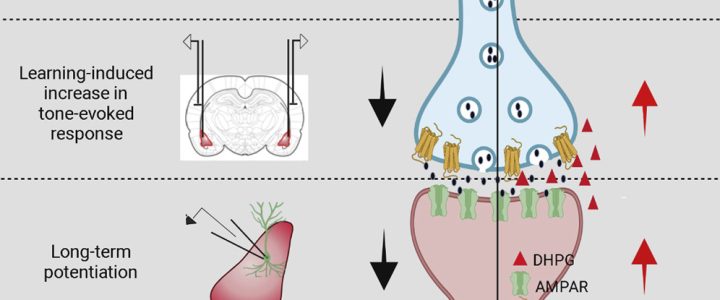
Cell Reports has published the results of the study “Correction of Amygdalar Dysfunction in Rat Model of Fragile X Syndrome” by FRAXA Investigator Dr. Sumatra Chattarji and his team at the National Centre for Biological Sciences in Bangalore, India. The researchers investigated the synaptic basis of deficient conditioned fear and its reversal in Fragile X syndrome rats.
Read morePurposeful and FRAXA Partnership Leads to Clinical Trial

Can a combination of drugs make a meaningful difference for people with Fragile X? A new clinical trial is going to find out. 15-20 adult men with Fragile X will be included in this trial to test the effects of an available drug and a nutritional supplement taken together.
Read moreInhibiting Nonsense – Mediated mRNA Decay: A Potential Treatment Approach for Fragile X

All cells have a kind of housecleaning service which sweeps away genetic errors. This is called nonsense-mediated mRNA decay (NMD). With a previous FRAXA grant, this team discovered runaway NMD in cells of Fragile X patients. It’s not yet known how this impacts people with Fragile X. With this grant, Dr. Maquat and Dr. Kurosaki will test drugs which can bring NMD back to normal levels.
Read moreExploring Drug Repurposing to Restore Hippocampal Function in FXS Mouse Models

A gene’s job is to produce a protein. In Fragile X syndrome, the FMR1 gene is mutated and cannot make FMRP, a protein which shapes connections between nerve cells (neurons) in the brain. These connections are the basis of learning and memory. This team has discovered a mechanism involving FMRP that is absolutely essential to control the connections between neurons. These connections are the basis of learning and memory. They will now test available drugs which directly target this mechanism, to see if they can treat Fragile X syndrome.
Read moreContribution of Microglia to the Therapeutic Effects of Metformin and Adiponectin in Fragile X Syndrome

The research team of Brian Christie, PhD and Marie-Eve Tremblay is developing ways to balance hormones, including drugs like metformin and changes in diet, which could not only reduce hunger and obesity, but ultimately also improve learning and behavior in Fragile X syndrome.
Read more20 Years of Advancing Fragile X Research: Progress Toward a Cure

Dr. Mark Bear joined the Fragile X field in 1999 when he received a research grant from FRAXA Research Foundation. At the time, we recognized the symptoms of Fragile X, and we knew its cause: a single missing protein. But we knew very little else. Dr. Bear traces the discoveries that now give us great optimism of finding effective treatments and ultimately a cure for Fragile X.
Read moreBrain Organoids, Moving Fragile X Research Forward

There are many ways research produces discoveries, and all of them include a process of steps that build on each other. When an exciting new avenue appeared with potential for Fragile X syndrome, FRAXA stepped up to fund it. We now see the results of this grant and are excited to share them with you. The importance of different types of models have been shared and discussed over many years. We are now adding a “brain organoid” model to this group, and the potential behind it is really exciting.
Read moreTetra’s Fragile X Clinical Trial – The Most Successful So Far

Dr. Mark Gurney, CEO of Tetra Therapeutics, discusses how one of the earliest clues to the biology of Fragile X led to the most successful Fragile X clinical trial to date. FRAXA and Tetra began working together after a key FRAXA-funded study caught the attention of Dr. Gurney. Through the FRAXA Drug Validation Initiative, Dr. Patricia Cogram was able to conduct preclinical validation experiments with Tetra’s lead compound in record time, paving the way for clinical trials.
Read moreAlternative Splicing in White Blood Cells: A Biomarker for Fragile X Syndrome

Explore groundbreaking research by the University of Massachusetts Medical School and Rush University Medical Center on alternative splicing in white blood cells as a biomarker for Fragile X syndrome, paving the way for personalized treatment optimization through a non-invasive blood test.
Read more2021 FRAXA Awards – Recognizing Perseverance and Dedication
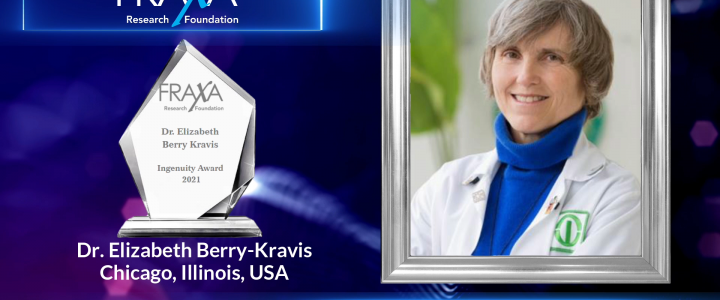
In conjunction with World Fragile X Day 2021, FRAXA Research Foundation is proud to recognize its annual award recipients. This year’s recipients exemplify the perseverance and dedication that has made FRAXA a global leader in Fragile X research for nearly 30 years. We are fortunate to partner with these individuals on research, community support and awareness efforts.
Read moreLink Between Lipid Profile, eCBome System and Gut Microbiome in Fragile X Syndrome

Why does obesity challenge so many people with Fragile X? Dr. Caku’s team thinks changes in the gut are the culprit. This team has found that Fragile X syndrome causes changes in the tiny organisms that live in our gut. They believe that these abnormalities cause changes in the brain which impair learning and behavior.
Read moreCharacterization of Microglia Transcriptional Profile in Fmr1 Knockout Mice Model

With this grant, the team will identify the pathways responsible for this excessive activation and attempt to reverse the excess. If they can correct this using drugs, they will be able to identify a new potential treatment for Fragile X syndrome solving one more piece of the Fragile X brain puzzle.
Read moreThe Role of Astrocyte BMP Signaling in Fragile X Syndrome

Astrocytes are star-shaped cells that make up one fifth of all cells in the human brain. Recently researchers found a specific pathway in astrocytes that is overactive in Fragile X syndrome, and they hope to bring this pathway back to normal with a drug. With this grant, the team will try to correct the pathway in Fragile X mice. The hope is that they will find a new potential treatment approach for Fragile X syndrome.
Read more
